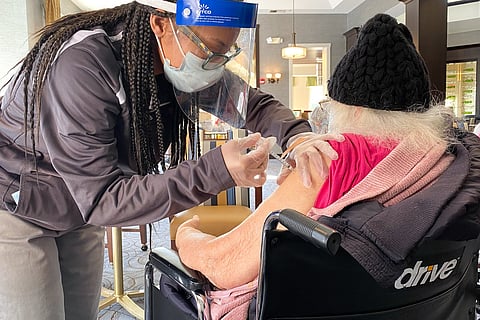Statewide Pandemic Relief Fund Sets $30M Goal for Vaccine Equity
by Ben Adlin
A statewide partnership of public officials and private groups on Monday, Feb. 15, announced plans to put $30 million toward a new equity initiative intended to boost COVID-19 vaccination rates among Black, Brown, Indigeneous, and People of Color (BIPOC) communities and other groups disproportionately affected by the pandemic.
"The goal on this initiative is to raise $15 million to match government dollars around vaccine outreach and education," said Lilliane Ballesteros, executive director of the Latino Community Fund of Washington. "Now is the time to mobilize our collective resources quickly to those in need."
The money will help pay for language-specific and culturally sensitive outreach and education, pop-up and mobile vaccination stations, as well as transportation to nearby vaccine sites. In addition to BIPOC communities, the initiative will center on refugees, immigrants, and people living in rural or remote areas of Washington state.
"Just as we saw the pandemic and economic crisis disproportionately impact these communities, we're also seeing some of the same disparities play out in terms of vaccine distribution across our state," said Tony Mestres, president and CEO of the Seattle Foundation.
The new vaccine equity initiative will be administered by All In WA, a coalition formed after the pandemic hit last year to raise aid for the state's most vulnerable communities.
In dispensing grants, said Ballesteros, who spoke for All In WA at Monday's press conference, the fund's advisory group "is going to be guided by where there is greatest need, with particular attention to BIPOC-led and community-rooted organizations."
While state data on vaccine rates by race and ethnicity are incomplete, a Seattle Times analysis this month found "clear gaps" in who's getting the vaccine. Black residents, for example, have received just 2% of initial vaccine doses but account for 6% of the state's COVID cases.
White people, meanwhile, made up about 48% of cases in the state, yet 67% of people who received a first dose of vaccine were white.
A report last week from the Washington State Department of Health shows similar racial disparities, with people who identified as Black, Hispanic, or multiracial comparatively behind on vaccinations relative to their population in the state.
"We are seeing disturbing disparities among under-resourced populations," said Jesus Hernandez, CEO of Family Health Centers, in Okanogan County.
"Some of the barriers that are contributing to these disparities," Hernandez said, "are things like transportation, online access, language barriers, and frankly addressing the fear that exists among communities because of either misinformation on social media or just lack of access to correct information."
To help reach target communities, All In WA will work with established groups and local leaders. "A lot of health systems are hiring health workers from these communities because they tap into those informal networks of individuals in their communities," Hernandez said, describing them as "trusted voices that can help address the lack of information or the inaccurate information that may be out there."
Gov. Jay Inslee said at Monday's event that the State has now administered more than a million doses of vaccine. "Now we want to have to have as much equity as humanly possible."
So far the State has spent about $4 million on outreach aimed at BIPOC communities, refugees, and immigrants, Inslee said, pointing to the fact that the State is making information available in 32 different languages, for example. Another $11 million has been earmarked for further vaccine equity efforts.
Officials are also increasing the number of doses being routed to marginalized communities, Inslee said. "About 20% of the entire state allocation is now going to community and immigrant health care providers. That's gone up significantly in the last couple of weeks."
Inslee said the State would not, however, adjust the state's eligibility rules for vaccines in order to give disproportionately impacted groups early access to the vaccines. "We're not going to make people eligible who are not eligible," he said.
Asked at Monday's press conference why philanthropy was necessary to fund what some might expect should be the government's responsibility to respond to a health care crisis, King County Executive Dow Constantine said fundraising was necessary "because fundamentally, public health is underfunded."
"We're very grateful for All In WA stepping up to help fill the gaps by our failure over decades to adapt our tax system to modern circumstances," he said, "but it should also be a signal to us that we could do much better if we stepped up to that overarching challenge and made sure that essential functions like public health were funded for the kinds of challenges we're facing right now."
Ben Adlin is a reporter and editor who grew up in the Pacific Northwest and currently lives on Capitol Hill. He's covered politics and legal affairs from Seattle and Los Angeles for the past decade and has been an Emerald contributor since May 2020, writing about community and municipal news. Find him on Twitter at @badlin.
Before you move on to the next story …
The South Seattle Emerald™ is brought to you by Rainmakers. Rainmakers give recurring gifts at any amount. With around 1,000 Rainmakers, the Emerald™ is truly community-driven local media. Help us keep BIPOC-led media free and accessible.
If just half of our readers signed up to give $6 a month, we wouldn't have to fundraise for the rest of the year. Small amounts make a difference.
We cannot do this work without you. Become a Rainmaker today!
Help keep BIPOC-led, community-powered journalism free — become a Rainmaker today.


